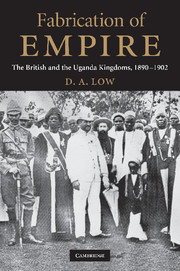Book contents
- Frontmatter
- Contents
- Preface
- List of abbreviations and locations
- Sketch maps
- 1 Prologue: survey and agenda
- 2 Statecraft: external intrusion and local dominion
- 3 Ferment: conversion and revolution in Buganda
- 4 Upcountry: might-have-beens and the Buganda/Uganda outcome
- 5 Warbands: new military formations and ground level imperialism
- 6 Paramountcy: Toro, Busoga and the new overlords
- 7 Defeat: Kabalega's resistance, Mwanga's revolt and the Sudanese mutiny
- 8 Succession: Nkore and the war of Igumira's eye
- 9 Dénouement: aggregations and rulerships
- 10 Government: colonial settlements and the Buganda model
- 11 Capstone: honour, awe and imperialism
- 12 Round up and review
- Select bibliography
- Index
5 - Warbands: new military formations and ground level imperialism
Published online by Cambridge University Press: 04 July 2009
- Frontmatter
- Contents
- Preface
- List of abbreviations and locations
- Sketch maps
- 1 Prologue: survey and agenda
- 2 Statecraft: external intrusion and local dominion
- 3 Ferment: conversion and revolution in Buganda
- 4 Upcountry: might-have-beens and the Buganda/Uganda outcome
- 5 Warbands: new military formations and ground level imperialism
- 6 Paramountcy: Toro, Busoga and the new overlords
- 7 Defeat: Kabalega's resistance, Mwanga's revolt and the Sudanese mutiny
- 8 Succession: Nkore and the war of Igumira's eye
- 9 Dénouement: aggregations and rulerships
- 10 Government: colonial settlements and the Buganda model
- 11 Capstone: honour, awe and imperialism
- 12 Round up and review
- Select bibliography
- Index
Summary
It is now time to take stock. Chapter 3 sketched the background to the religio-political hostilities which erupted in Buganda in 1888. It traced the multiple changes of fortune which its Muslim, Catholic and Protestant forces suffered over the next five years, in which the first British imperial agents to station themselves in the country took it upon themselves by 1892–3 to be the principal arbiters. Setting all of that aside for the time being, Chapter 4 canvassed the uneven succession of might-have-beens for East Africa amongst the highly presumptuous delineations of altogether new, large-scale, territorial political arenas, which characterised the onset and course of the late nineteenth-century European ‘scramble for Africa’. It then tracked through the seminal demarcations which gave birth to East Africa's subsequent entrenched political map. In doing so, it honed in on the fortuitous fabrication of the new, relatively small, upcountry polity of ‘Uganda’, and followed the uncertain course which, in the end, locked the British into centring this in Buganda.
The first British colonial agents in Buganda did not, however, see their overriding task to be either that of umpires in the religio-political conflicts wracking Buganda, or that of emissaries pegging out claims to territories allocated to Britain under international agreements.
- Type
- Chapter
- Information
- Fabrication of EmpireThe British and the Uganda Kingdoms, 1890–1902, pp. 127 - 149Publisher: Cambridge University PressPrint publication year: 2009



